Fleurs du Mal Magazine


 De stenen die de huizen bouwen
De stenen die de huizen bouwen
Kate Tempest
De debuutroman van bekroonde dichter en succesvolle rapper Kate Tempest
De jonge Londenaren Becky, Harry en Leon verlaten de stad in een vierdehands Ford Cortina met een koffer vol gestolen geld. Pete, Becky’s vriendje, laten ze ook achter, op de avond van zijn surpriseparty. In De stenen die de huizen bouwen laat Kate Tempest je het hedendaagse leven in rauw Londen verkennen, bekeken door een haarscherpe morele microscoop. Ze neemt je mee naar de huizen en harten van gewone mensen en hun families en laat je op die manier momenten van schoonheid, teleurstelling, ambitie en mislukking zien. En ze laat zien: goede bedoelingen leiden niet altijd tot goede beslissingen.
Scherp maar nooit cynisch, en gedreven door empathie en ethiek roept De stenen die de huizen bouwen de vraag op hoe we met elkaar kunnen leven en van elkaar kunnen houden
“Het trekt in je botten. Je beseft het pas als je erdoorheen rijdt en kijkt naar alle vertrouwde dingen die je achter je laat. Ze passeren de straten, de winkels, de hoeken waar ze zich hebben opgewerkt. Overal starende schimmen. Slechte huid en holle ogen, waanzinnig naar hen grijnzend vanuit het verleden.
Het zit in hun botten. Brood en drank en beton. De schoonheid ervan. Al die kleine momenten op hun netvlies gebrand. Predikanten, ouders, arbeiders. Dof kijkende dromers zonder bestemming. Straatlantaarns en verkeer, lichamen te begraven en baby’s te baren. Een baan. Gewoon een baan.
Mensen moorden opnieuw uit naam van goden. Geld vermoordt ons allemaal. Ze leven in een allesoverheersende eenzaamheid waaruit vanzelf vriendschappen ontstaan. Hun dagen brengen ze starend naar dingen door. Ze bestaan binnen de massa en voelen zich deel van het geheel. Ze vertrouwen alleen op trends. Hoogstens hopend op een avondje hard gaan, naar de kloten door drank en drugs die de volgende ochtend hun vijand zijn.”

De stenen die de huizen bouwen
Kate Tempest
Uitgave: Paperback met flappen
Vertaling: Roos van de Wardt, Astrid Huisman
Publicatiedatum: sept. 2016
Pagina’s: 384
Prijs: € 19,99
Uitg. Meulenhoff
ISBN: 9789029091329
Over De stenen die de huizen bouwen
‘Een van de meest briljante Britse talenten.’ The Guardian
‘Ik wilde hier een kritiekloze ode houden aan Kate Tempest. De 29-jarige rapper, dichter, toneelschrijver uit Londen is “aanstormend” – ze won poëzieprijzen en treedt op in uitverkochte concertzalen – maar in Nederland is ze nog onbekend bij het grote publiek.’ Simone van Saarloos, NRC Handelsblad
“Een indrukwekkende roman.” Theo Hakkert, verstwee.nl
fleursdumal.nl magazine
More in: - Book News, Archive S-T, Art & Literature News, Kate/Kae Tempest, Tempest, Kate/Kae
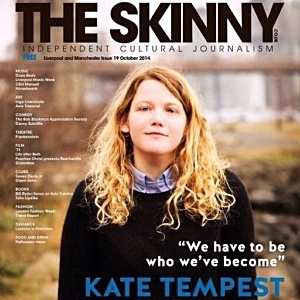 Kate Tempest vecht met twee wapens; haar pen en haar stem. Als artiest won ze meerdere poetry slams en bracht in 2014 als rapper haar tweede album ‘Everybody Down’ uit. Daarnaast publiceerde ze als schrijfster een dichtbundel en een roman en schreef tussendoor nog een toneelstuk. Op het podium brengt Kate Tempest verhalen tot leven met haar unieke mix van indie-hiphop vol rauwe, poëtische raps over het grauwe stadsleven in Londen. Tekstueel één van de meest interessante en urgente lyricisten van dit moment.
Kate Tempest vecht met twee wapens; haar pen en haar stem. Als artiest won ze meerdere poetry slams en bracht in 2014 als rapper haar tweede album ‘Everybody Down’ uit. Daarnaast publiceerde ze als schrijfster een dichtbundel en een roman en schreef tussendoor nog een toneelstuk. Op het podium brengt Kate Tempest verhalen tot leven met haar unieke mix van indie-hiphop vol rauwe, poëtische raps over het grauwe stadsleven in Londen. Tekstueel één van de meest interessante en urgente lyricisten van dit moment.
donderdag 10 november 2016 – 19:30 uur
The Max
Melkweg
Lijnbaansgracht 234a
1017 PH Amsterdam
Telefoon: 020-5318181
# Meer info op website Melkweg Amsterdam
fleursdumal.nl magazine
More in: #More Poetry Archives, Archive S-T, Art & Literature News, Kate/Kae Tempest, Performing arts, Tempest, Kate/Kae, THEATRE
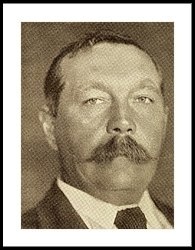 A False Start
A False Start
by Arthur Conan Doyle
“Is Dr. Horace Wilkinson at home?”
“I am he. Pray step in.”
The visitor looked somewhat astonished at having the door opened to him by the master of the house.
“I wanted to have a few words.”
The doctor, a pale, nervous young man, dressed in an ultra-professional, long black frock-coat, with a high, white collar cutting off his dapper side-whiskers in the centre, rubbed his hands together and smiled. In the thick, burly man in front of him he scented a patient, and it would be his first. His scanty resources had begun to run somewhat low, and, although he had his first quarter’s rent safely locked away in the right-hand drawer of his desk, it was becoming a question with him how he should meet the current expenses of his very simple housekeeping. He bowed, therefore, waved his visitor in, closed the hall door in a careless fashion, as though his own presence thereat had been a purely accidental circumstance, and finally led the burly stranger into his scantily furnished front room, where he motioned him to a seat. Dr. Wilkinson planted himself behind his desk, and, placing his finger-tips together, he gazed with some apprehension at his companion. What was the matter with the man? He seemed very red in the face. Some of his old professors would have diagnosed his case by now, and would have electrified the patient by describing his own symptoms before he had said a word about them. Dr. Horace Wilkinson racked his brains for some clue, but Nature had fashioned him as a plodder—a very reliable plodder and nothing more. He could think of nothing save that the visitor’s watch-chain had a very brassy appearance, with a corollary to the effect that he would be lucky if he got half-a-crown out of him. Still, even half-a-crown was something in those early days of struggle.
Whilst the doctor had been running his eyes over the stranger, the latter had been plunging his hands into pocket after pocket of his heavy coat. The heat of the weather, his dress, and this exercise of pocket-rummaging had all combined to still further redden his face, which had changed from brick to beet, with a gloss of moisture on his brow. This extreme ruddiness brought a clue at last to the observant doctor. Surely it was not to be attained without alcohol. In alcohol lay the secret of this man’s trouble. Some little delicacy was needed, however, in showing him that he had read his case aright—that at a glance he had penetrated to the inmost sources of his ailments.
“It’s very hot,” observed the stranger, mopping his forehead.
“Yes, it is weather which tempts one to drink rather more beer than is good for one,” answered Dr. Horace Wilkinson, looking very knowingly at his companion from over his finger-tips.
“Dear, dear, you shouldn’t do that.”
“I! I never touch beer.”
“Neither do I. I’ve been an abstainer for twenty years.”
This was depressing. Dr. Wilkinson blushed until he was nearly as red as the other. “May I ask what I can do for you?” he asked, picking up his stethoscope and tapping it gently against his thumb-nail.
“Yes, I was just going to tell you. I heard of your coming, but I couldn’t get round before——” He broke into a nervous little cough.
“Yes?” said the doctor encouragingly.
“I should have been here three weeks ago, but you know how these things get put off.” He coughed again behind his large red hand.
“I do not think that you need say anything more,” said the doctor, taking over the case with an easy air of command. “Your cough is quite sufficient. It is entirely bronchial by the sound. No doubt the mischief is circumscribed at present, but there is always the danger that it may spread, so you have done wisely to come to me. A little judicious treatment will soon set you right. Your waistcoat, please, but not your shirt. Puff out your chest and say ninety-nine in a deep voice.”
The red-faced man began to laugh. “It’s all right, doctor,” said he. “That cough comes from chewing tobacco, and I know it’s a very bad habit. Nine-and-ninepence is what I have to say to you, for I’m the officer of the gas company, and they have a claim against you for that on the metre.”
Dr. Horace Wilkinson collapsed into his chair. “Then you’re not a patient?” he gasped.
“Never needed a doctor in my life, sir.”
“Oh, that’s all right.” The doctor concealed his disappointment under an affectation of facetiousness. “You don’t look as if you troubled them much. I don’t know what we should do if every one were as robust. I shall call at the company’s offices and pay this small amount.”
“If you could make it convenient, sir, now that I am here, it would save trouble——”
“Oh, certainly!” These eternal little sordid money troubles were more trying to the doctor than plain living or scanty food. He took out his purse and slid the contents on to the table. There were two half-crowns and some pennies. In his drawer he had ten golden sovereigns. But those were his rent. If he once broke in upon them he was lost. He would starve first.
“Dear me!” said he, with a smile, as at some strange, unheard-of incident. “I have run short of small change. I am afraid I shall have to call upon the company, after all.”
“Very well, sir.” The inspector rose, and with a practised glance around, which valued every article in the room, from the two-guinea carpet to the eight-shilling muslin curtains, he took his departure.
When he had gone Dr. Wilkinson rearranged his room, as was his habit a dozen times in the day. He laid out his large Quain’s Dictionary of Medicine in the forefront of the table so as to impress the casual patient that he had ever the best authorities at his elbow. Then he cleared all the little instruments out of his pocket-case—the scissors, the forceps, the bistouries, the lancets—and he laid them all out beside the stethoscope, to make as good a show as possible. His ledger, day-book, and visiting-book were spread in front of him. There was no entry in any of them yet, but it would not look well to have the covers too glossy and new, so he rubbed them together and daubed ink over them. Neither would it be well that any patient should observe that his name was the first in the book, so he filled up the first page of each with notes of imaginary visits paid to nameless patients during the last three weeks. Having done all this, he rested his head upon his hands and relapsed into the terrible occupation of waiting.
Terrible enough at any time to the young professional man, but most of all to one who knows that the weeks, and even the days during which he can hold out are numbered. Economise as he would, the money would still slip away in the countless little claims which a man never understands until he lives under a rooftree of his own. Dr. Wilkinson could not deny, as he sat at his desk and looked at the little heap of silver and coppers, that his chances of being a successful practitioner in Sutton were rapidly vanishing away.
And yet it was a bustling, prosperous town, with so much money in it that it seemed strange that a man with a trained brain and dexterous fingers should be starved out of it for want of employment. At his desk, Dr. Horace Wilkinson could see the never-ending double current of people which ebbed and flowed in front of his window. It was a busy street, and the air was forever filled with the dull roar of life, the grinding of the wheels, and the patter of countless feet. Men, women, and children, thousands and thousands of them passed in the day, and yet each was hurrying on upon his own business, scarce glancing at the small brass plate, or wasting a thought upon the man who waited in the front room. And yet how many of them would obviously, glaringly have been the better for his professional assistance. Dyspeptic men, anemic women, blotched faces, bilious complexions—they flowed past him, they needing him, he needing them, and yet the remorseless bar of professional etiquette kept them forever apart. What could he do? Could he stand at his own front door, pluck the casual stranger by the sleeve, and whisper in his ear, “Sir, you will forgive me for remarking that you are suffering from a severe attack of acne rosacea, which makes you a peculiarly unpleasant object. Allow me to suggest that a small prescription containing arsenic, which will not cost you more than you often spend upon a single meal, will be very much to your advantage.” Such an address would be a degradation to the high and lofty profession of Medicine, and there are no such sticklers for the ethics of that profession as some to whom she has been but a bitter and a grudging mother.
Dr. Horace Wilkinson was still looking moodily out of the window, when there came a sharp clang at the bell. Often it had rung, and with every ring his hopes had sprung up, only to dwindle away again, and change to leaden disappointment, as he faced some beggar or touting tradesman. But the doctor’s spirit was young and elastic, and again, in spite of all experience, it responded to that exhilarating summons. He sprang to his feet, cast his eyes over the table, thrust out his medical books a little more prominently, and hurried to the door. A groan escaped him as he entered the hall. He could see through the half-glazed upper panels that a gypsy van, hung round with wicker tables and chairs, had halted before his door, and that a couple of the vagrants, with a baby, were waiting outside. He had learned by experience that it was better not even to parley with such people.
“I have nothing for you,” said he, loosing the latch by an inch. “Go away!”
He closed the door, but the bell clanged once more. “Get away! Get away!” he cried impatiently, and walked back into his consulting-room. He had hardly seated himself when the bell went for the third time. In a towering passion he rushed back, flung open the door.
“What the——?”
“If you please, sir, we need a doctor.”
In an instant he was rubbing his hands again with his blandest professional smile. These were patients, then, whom he had tried to hunt from his doorstep—the very first patients, whom he had waited for so impatiently. They did not look very promising. The man, a tall, lank-haired gypsy, had gone back to the horse’s head. There remained a small, hard-faced woman with a great bruise all round her eye. She wore a yellow silk handkerchief round her head, and a baby, tucked in a red shawl, was pressed to her bosom.
“Pray step in, madam,” said Dr. Horace Wilkinson, with his very best sympathetic manner. In this case, at least, there could be no mistake as to diagnosis. “If you will sit on this sofa, I shall very soon make you feel much more comfortable.”
He poured a little water from his carafe into a saucer, made a compress of lint, fastened it over the injured eye, and secured the whole with a spica bandage, secundum artem.
“Thank ye kindly, sir,” said the woman, when his work was finished; “that’s nice and warm, and may God bless your honour. But it wasn’t about my eye at all that I came to see a doctor.”
“Not your eye?” Dr. Horace Wilkinson was beginning to be a little doubtful as to the advantages of quick diagnosis. It is an excellent thing to be able to surprise a patient, but hitherto it was always the patient who had surprised him.
“The baby’s got the measles.”
The mother parted the red shawl, and exhibited a little dark, black-eyed gypsy baby, whose swarthy face was all flushed and mottled with a dark-red rash. The child breathed with a rattling sound, and it looked up at the doctor with eyes which were heavy with want of sleep and crusted together at the lids.
“Hum! Yes. Measles, sure enough—and a smart attack.”
“I just wanted you to see her, sir, so that you could signify.”
“Could what?”
“Signify, if anything happened.”
“Oh, I see—certify.”
“And now that you’ve seen it, sir, I’ll go on, for Reuben—that’s my man—is in a hurry.”
“But don’t you want any medicine?”
“Oh, now you’ve seen it, it’s all right. I’ll let you know if anything happens.”
“But you must have some medicine. The child is very ill.” He descended into the little room which he had fitted as a surgery, and he made up a two-ounce bottle of cooling medicine. In such cities as Sutton there are few patients who can afford to pay a fee to both doctor and chemist, so that unless the physician is prepared to play the part of both he will have little chance of making a living at either.
“There is your medicine, madam. You will find the directions upon the bottle. Keep the child warm and give it a light diet.”
“Thank you kindly, sir.” She shouldered her baby and marched for the door.
“Excuse me, madam,” said the doctor nervously. “Don’t you think it too small a matter to make a bill of? Perhaps it would be better if we had a settlement at once.”
The gypsy woman looked at him reproachfully out of her one uncovered eye.
“Are you going to charge me for that?” she asked. “How much, then?”
“Well, say half-a-crown.” He mentioned the sum in a half-jesting way, as though it were too small to take serious notice of, but the gypsy woman raised quite a scream at the mention of it.
“‘Arf-a-crown! for that?”
“Well, my good woman, why not go to the poor doctor if you cannot afford a fee?”
She fumbled in her pocket, craning awkwardly to keep her grip upon the baby.
“Here’s sevenpence,” she said at last, holding out a little pile of copper coins. “I’ll give you that and a wicker footstool.”
“But my fee is half-a-crown.” The doctor’s views of the glory of his profession cried out against this wretched haggling, and yet what was he to do? “Where am I to get ‘arf-a-crown? It is well for gentlefolk like you who sit in your grand houses, and can eat and drink what you like, an’ charge ‘arf-a-crown for just saying as much as, ”Ow d’ye do?’ We can’t pick up’ arf-crowns like that. What we gets we earns ‘ard. This sevenpence is just all I’ve got. You told me to feed the child light. She must feed light, for what she’s to have is more than I know.”
Whilst the woman had been speaking, Dr. Horace Wilkinson’s eyes had wandered to the tiny heap of money upon the table, which represented all that separated him from absolute starvation, and he chuckled to himself at the grim joke that he should appear to this poor woman to be a being living in the lap of luxury. Then he picked up the odd coppers, leaving only the two half-crowns upon the table.
“Here you are,” he said brusquely. “Never mind the fee, and take these coppers. They may be of some use to you. Good-bye!” He bowed her out, and closed the door behind her. After all she was the thin edge of the wedge. These wandering people have great powers of recommendation. All large practices have been built up from such foundations. The hangers-on to the kitchen recommend to the kitchen, they to the drawing-room, and so it spreads. At least he could say now that he had had a patient.
He went into the back room and lit the spirit-kettle to boil the water for his tea, laughing the while at the recollection of his recent interview. If all patients were like this one it could easily be reckoned how many it would take to ruin him completely. Putting aside the dirt upon his carpet and the loss of time, there were twopence gone upon the bandage, fourpence or more upon the medicine, to say nothing of phial, cork, label, and paper. Then he had given her fivepence, so that his first patient had absorbed altogether not less than one sixth of his available capital. If five more were to come he would be a broken man. He sat down upon the portmanteau and shook with laughter at the thought, while he measured out his one spoonful and a half of tea at one shilling eightpence into the brown earthenware teapot. Suddenly, however, the laugh faded from his face, and he cocked his ear towards the door, standing listening with a slanting head and a sidelong eye. There had been a rasping of wheels against the curb, the sound of steps outside, and then a loud peal at the bell. With his teaspoon in his hand he peeped round the corner and saw with amazement that a carriage and pair were waiting outside, and that a powdered footman was standing at the door. The spoon tinkled down upon the floor, and he stood gazing in bewilderment. Then, pulling himself together, he threw open the door.
“Young man,” said the flunky, “tell your master, Dr. Wilkinson, that he is wanted just as quick as ever he can come to Lady Millbank, at the Towers. He is to come this very instant. We’d take him with us, but we have to go back to see if Dr. Mason is home yet. Just you stir your stumps and give him the message.”
The footman nodded and was off in an instant, while the coachman lashed his horses and the carriage flew down the street.
Here was a new development. Dr. Horace Wilkinson stood at his door and tried to think it all out. Lady Millbank, of the Towers! People of wealth and position, no doubt. And a serious case, or why this haste and summoning of two doctors? But, then, why in the name of all that is wonderful should he be sent for?
He was obscure, unknown, without influence. There must be some mistake. Yes, that must be the true explanation; or was it possible that some one was attempting a cruel hoax upon him? At any rate, it was too positive a message to be disregarded. He must set off at once and settle the matter one way or the other.
But he had one source of information. At the corner of the street was a small shop where one of the oldest inhabitants dispensed newspapers and gossip. He could get information there if anywhere. He put on his well-brushed top hat, secreted instruments and bandages in all his pockets, and without waiting for his tea closed up his establishment and started off upon his adventure.
The stationer at the corner was a human directory to every one and everything in Sutton, so that he soon had all the information which he wanted. Sir John Millbank was very well known in the town, it seemed. He was a merchant prince, an exporter of pens, three times mayor, and reported to be fully worth two millions sterling.
The Towers was his palatial seat, just outside the city. His wife had been an invalid for some years, and was growing worse. So far the whole thing seemed to be genuine enough. By some amazing chance these people really had sent for him.
And then another doubt assailed him, and he turned back into the shop.
“I am your neighbour, Dr. Horace Wilkinson,” said he. “Is there any other medical man of that name in the town?”
No, the stationer was quite positive that there was not.
That was final, then. A great good fortune had come in his way, and he must take prompt advantage of it. He called a cab and drove furiously to the Towers, with his brain in a whirl, giddy with hope and delight at one moment, and sickened with fears and doubts at the next lest the case should in some way be beyond his powers, or lest he should find at some critical moment that he was without the instrument or appliance that was needed. Every strange and outre case of which he had ever heard or read came back into his mind, and long before he reached the Towers he had worked himself into a positive conviction that he would be instantly required to do a trephining at the least.
The Towers was a very large house, standing back amid trees, at the head of a winding drive. As he drove up the doctor sprang out, paid away half his worldly assets as a fare, and followed a stately footman who, having taken his name, led him through the oak-panelled, stained-glass hall, gorgeous with deers’ heads and ancient armour, and ushered him into a large sitting-room beyond. A very irritable-looking, acid-faced man was seated in an armchair by the fireplace, while two young ladies in white were standing together in the bow window at the further end.
“Hullo! hullo! hullo! What’s this—heh?” cried the irritable man. “Are you Dr. Wilkinson? Eh?”
“Yes, sir, I am Dr. Wilkinson.”
“Really, now. You seem very young—much younger than I expected. Well, well, well, Mason’s old, and yet he don’t seem to know much about it. I suppose we must try the other end now. You’re the Wilkinson who wrote something about the lungs? Heh?”
Here was a light! The only two letters which the doctor had ever written to The Lancet—modest little letters thrust away in a back column among the wrangles about medical ethics and the inquiries as to how much it took to keep a horse in the country—had been upon pulmonary disease. They had not been wasted, then. Some eye had picked them out and marked the name of the writer. Who could say that work was ever wasted, or that merit did not promptly meet with its reward?
“Yes, I have written on the subject.”
“Ha! Well, then, where’s Mason?”
“I have not the pleasure of his acquaintance.”
“No?—that’s queer too. He knows you and thinks a lot of your opinion. You’re a stranger in the town, are you not?”
“Yes, I have only been here a very short time.”
“That was what Mason said. He didn’t give me the address. Said he would call on you and bring you, but when the wife got worse of course I inquired for you and sent for you direct. I sent for Mason, too, but he was out. However, we can’t wait for him, so just run away upstairs and do what you can.”
“Well, I am placed in a rather delicate position,” said Dr. Horace Wilkinson, with some hesitation. “I am here, as I understand, to meet my colleague, Dr. Mason, in consultation. It would, perhaps, hardly be correct for me to see the patient in his absence. I think that I would rather wait.”
“Would you, by Jove! Do you think I’ll let my wife get worse while the doctor is coolly kicking his heels in the room below? No, sir, I am a plain man, and I tell you that you will either go up or go out.”
The style of speech jarred upon the doctor’s sense of the fitness of things, but still when a man’s wife is ill much may be overlooked. He contented himself by bowing somewhat stiffly. “I shall go up, if you insist upon it,” said he.
“I do insist upon it. And another thing, I won’t have her thumped about all over the chest, or any hocus-pocus of the sort. She has bronchitis and asthma, and that’s all. If you can cure it well and good. But it only weakens her to have you tapping and listening, and it does no good either.”
Personal disrespect was a thing that the doctor could stand; but the profession was to him a holy thing, and a flippant word about it cut him to the quick.
“Thank you,” said he, picking up his hat. “I have the honour to wish you a very good day. I do not care to undertake the responsibility of this case.”
“Hullo! what’s the matter now?”
“It is not my habit to give opinions without examining my patient. I wonder that you should suggest such a course to a medical man. I wish you good day.”
But Sir John Millbank was a commercial man, and believed in the commercial principle that the more difficult a thing is to attain the more valuable it is. A doctor’s opinion had been to him a mere matter of guineas. But here was a young man who seemed to care nothing either for his wealth or title. His respect for his judgment increased amazingly.
“Tut! tut!” said he; “Mason is not so thin-skinned. There! there! Have your way! Do what you like and I won’t say another word. I’ll just run upstairs and tell Lady Millbank that you are coming.”
The door had hardly closed behind him when the two demure young ladies darted out of their corner, and fluttered with joy in front of the astonished doctor.
“Oh, well done! well done!” cried the taller, clapping her hands.
“Don’t let him bully you, doctor,” said the other. “Oh, it was so nice to hear you stand up to him. That’s the way he does with poor Dr. Mason. Dr. Mason has never examined mamma yet. He always takes papa’s word for everything. Hush, Maude; here he comes again.” They subsided in an instant into their corner as silent and demure as ever.
Dr. Horace Wilkinson followed Sir John up the broad, thick-carpeted staircase, and into the darkened sick room. In a quarter of an hour he had sounded and sifted the case to the uttermost, and descended with the husband once more to the drawing-room. In front of the fireplace were standing two gentlemen, the one a very typical, clean-shaven, general practitioner, the other a striking-looking man of middle age, with pale blue eyes and a long red beard.
“Hullo, Mason, you’ve come at last!”
“Yes, Sir John, and I have brought, as I promised, Dr. Wilkinson with me.”
“Dr. Wilkinson! Why, this is he.”
Dr. Mason stared in astonishment. “I have never seen the gentleman before!” he cried.
“Nevertheless I am Dr. Wilkinson—Dr. Horace Wilkinson, of 114 Canal View.”
“Good gracious, Sir John!” cried Dr. Mason.
“Did you think that in a case of such importance I should call in a junior local practitioner! This is Dr. Adam Wilkinson, lecturer on pulmonary diseases at Regent’s College, London, physician upon the staff of the St. Swithin’s Hospital, and author of a dozen works upon the subject. He happened to be in Sutton upon a visit, and I thought I would utilise his presence to have a first-rate opinion upon Lady Millbank.”
“Thank you,” said Sir John, dryly. “But I fear my wife is rather tired now, for she has just been very thoroughly examined by this young gentleman. I think we will let it stop at that for the present; though, of course, as you have had the trouble of coming here, I should be glad to have a note of your fees.”
When Dr. Mason had departed, looking very disgusted, and his friend, the specialist, very amused, Sir John listened to all the young physician had to say about the case.
“Now, I’ll tell you what,” said he, when he had finished. “I’m a man of my word, d’ye see? When I like a man I freeze to him. I’m a good friend and a bad enemy. I believe in you, and I don’t believe in Mason. From now on you are my doctor, and that of my family. Come and see my wife every day. How does that suit your book?”
“I am extremely grateful to you for your kind intentions toward me, but I am afraid there is no possible way in which I can avail myself of them.”
“Heh! what d’ye mean?”
“I could not possibly take Dr. Mason’s place in the middle of a case like this. It would be a most unprofessional act.”
“Oh, well, go your own way!” cried Sir John, in despair. “Never was such a man for making difficulties. You’ve had a fair offer and you’ve refused it, and now you can just go your own way.”
The millionaire stumped out of the room in a huff, and Dr. Horace Wilkinson made his way homeward to his spirit-lamp and his one-and-eightpenny tea, with his first guinea in his pocket, and with a feeling that he had upheld the best traditions of his profession.
And yet this false start of his was a true start also, for it soon came to Dr. Mason’s ears that his junior had had it in his power to carry off his best patient and had forborne to do so. To the honour of the profession be it said that such forbearance is the rule rather than the exception, and yet in this case, with so very junior a practitioner and so very wealthy a patient, the temptation was greater than is usual. There was a grateful note, a visit, a friendship, and now the well-known firm of Mason and Wilkinson is doing the largest family practice in Sutton.
Sir Arthur Conan Doyle (1859 – 1930)
Round the Red Lamp: Being Facts and Fancies of Medical Life
A False Start (#05)
fleursdumal.nl magazine
More in: Doyle, Arthur Conan, Doyle, Arthur Conan, DRUGS & DISEASE & MEDICINE & LITERATURE, Round the Red Lamp
 Shakespeare Sonnetten
Shakespeare Sonnetten
Mis het niet: alleen op zaterdag 19 november!
Op zaterdag 19 november 2016 organiseert Toneelgroep De Appel een middag waarin zoveel mogelijk sonnetten van Shakespeare worden voorgedragen. Een uniek evenement waaraan vele (ex) Appelacteurs en andere bekenden uit de wereld van theater, onderwijs en politiek aan deelnemen. Tussen de sonnetten door kan er bij de bar een drankje gekocht worden.
Inmiddels hebben de volgende gasten toegezegd om mee te doen: Sara Bergen, Casper van Bohemen, Peter Bolhuis, Marjet van Cleeff, Jan van Eijndthoven, Stephan Evenblij, Stef Feld, Hubert Fermin, Casper Gimbrère, Flore Hageman, Roel Janssen, Tom Jaspers, Katarina Justic, Sofieke de Kater, Joop Keesmaat, Yvonne Keuls, Trudi Klever, Leonoor Koster, Marjolein Linck, Hugo Maerten, Martine de Moor, Marcel Ott, Jan Pronk, Tatiana Radier, Trins Snijders, Gertjan Spuij, Nicolien van der Veer, René Vernout, Leny Vos en Daan Wetering.
Toneelgroep De Appel
Toneelgroep De Appel staat o.a. voor bijzondere en groot gemonteerde theaterproducties. Het gezelschap is wat betreft artistieke uitstraling en publieksbereik niet weg te denken uit het Nederlandse theaterlandschap.
Het ensemble
Binnen het Nederlands toneel is een hecht ensemble een zeldzaam verschijnsel geworden. Voor De Appel is het ensemble essentieel. Dat betekent dat ook in de repertoirekeuze rekening wordt gehouden met een optimale bezetting vanuit het eigen ensemble. Natuurlijk worden er bij vrijwel iedere productie ook gastacteurs aangetrokken.
Het Appeltheater
De Appel bespeelt al vele jaren het eigen Appeltheater aan de Duinstraat in Scheveningen. Ooit de remise van de Haagse paardentram, maar door De Appel omgebouwd tot een flexibel sfeervol theater. Een theater waarin het gezelschap naar eigen inzicht kan experimenteren, waarin gezocht kan worden naar publieksopstellingen die passen bij het stuk. Geen gezelschap heeft de flexibiliteit van de eigen ruimte zozeer in haar voorstellingen zichtbaar weten te maken. Vormgevers als Tom Schenk, André Joosten, Guus van Geffen en Theo Tienhooven hebben – ruimtelijk gezien – in het Appeltheater hun grootste wonderen verricht.
Het Appeltheater is een uniek gebouw waar het publiek steeds wordt verrast en zich in een andere omgeving waant. Het hart van het gezelschap wordt gevormd door het spelersensemble waarin alle generaties zijn vertegenwoordigd.
Het Appeltheater beschikt over drie zalen waarin de voorstellingen worden gemaakt, de grote zaal met een capaciteit van tussen de 300 en 500 toeschouwers (afhankelijk van de tribune opstelling) en twee studio’s met ieder ongeveer 100 stoelen.
zaterdag 19 november 2016, aanvang 14.30 uur, Appeltheater
kaarten € 17,50 / Appelvrienden/CJP + Studentenkaart + Cultuurkaart € 15,-
# Kaarten bestellen klik hier
fleursdumal.nl magazine
More in: Archive S-T, Art & Literature News, Shakespeare, William, THEATRE
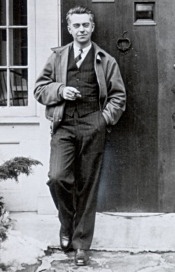
Hart Crane
(1889 – 1932)
Forgetfulness
Forgetfulness is like a song
That, freed from beat and measure, wanders.
Forgetfulness is like a bird whose wings are reconciled,
Outspread and motionless, —
A bird that coasts the wind unwearyingly.
Forgetfulness is rain at night,
Or an old house in a forest, — or a child.
Forgetfulness is white, — white as a blasted tree,
And it may stun the sybil into prophecy,
Or bury the Gods.
I can remember much forgetfulness.
Hart Crane poetry
fleursdumal.nl magazine
More in: Archive C-D, Crane, Hart
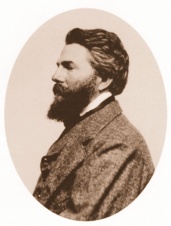
Herman Melville
(1819 – 1891)
Pipe Song
Care is all stuff:–
Puff! Puff!
To puff is enough:–
Puff! Puff
More musky than snuff,
And warm is a puff:–
Puff! Puff
Here we sit mid our puffs,
Like old lords in their ruffs,
Snug as bears in their muffs:–
Puff! Puff
Then puff, puff, puff,
For care is all stuff,
Puffed off in a puff–
Puff! Puff!
Herman Melville poetry
fleursdumal.nl magazine
More in: Archive M-N, Herman Melville
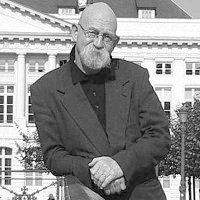
Buiten konvooi
Laat koel van hoofd en kalm van hart
de nacht de nacht. Er kraakt niets zacht.
Vreemde liederen schuren in oren,
spannen weemoed over afvaart.
Altijd op zoek naar wat verdwijnen
gaat ben je met oude woorden. Ze
weerspiegelen gewiste schaduw.
Bedaar de golven, stil de stem. Maak
voort, stuurman. En zwijg maar over
golving. Zet geen spie tussen de uren.
Doe de avond leunen op het kompas.
Boots: laat oorlammen aanrukken!
Bert Bevers
fleursdumal.nl magazine
More in: Archive A-B, Bevers, Bert
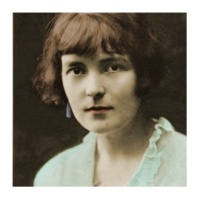 A Suburban Fairy Tale
A Suburban Fairy Tale
by Katherine Mansfield
Mr. and Mrs. B. sat at breakfast in the cosy red dining-room of their “snug little crib just under half-an-hour’s run from the City.”
There was a good fire in the grate—for the dining-room was the living-room as well—the two windows overlooking the cold empty garden patch were closed, and the air smelled agreeably of bacon and eggs, toast and coffee. Now that this rationing business was really over Mr. B. made a point of a thoroughly good tuck-in before facing the very real perils of the day. He didn’t mind who knew it—he was a true Englishman about his breakfast—he had to have it; he’d cave in without it, and if you told him that these Continental chaps could get through half the morning’s work he did on a roll and a cup of coffee—you simply didn’t know what you were talking about.
Mr. B. was a stout youngish man who hadn’t been able—worse luck—to chuck his job and join the Army; he’d tried for four years to get another chap to take his place but it was no go. He sat at the head of the table reading the Daily Mail. Mrs. B. was a youngish plump little body, rather like a pigeon. She sat opposite, preening herself behind the coffee set and keeping an eye of warning love on little B. who perched between them, swathed in a napkin and tapping the top of a soft-boiled egg.
Alas! Little B. was not at all the child that such parents had every right to expect. He was no fat little trot, no dumpling, no firm little pudding. He was under-sized for his age, with legs like macaroni, tiny claws, soft, soft hair that felt like mouse fur, and big wide-open eyes. For some strange reason everything in life seemed the wrong size for Little B.—too big and too violent. Everything knocked him over, took the wind out of his feeble sails and left him gasping and frightened. Mr. and Mrs. B. were quite powerless to prevent this; they could only pick him up after the mischief was done—and try to set him going again. And Mrs. B. loved him as only weak children are loved—and when Mr. B. thought what a marvellous little chap he was too—thought of the spunk of the little man, he—well he—by George—he …
“Why aren’t there two kinds of eggs?” said Little B. “Why aren’t there little eggs for children and big eggs like what this one is for grown-ups?”
“Scotch hares,” said Mr. B. “Fine Scotch hares for 5s. 3d. How about getting one, old girl?”
“It would be a nice change, wouldn’t it?” said Mrs. B. “Jugged.”
And they looked across at each other and there floated between them the Scotch hare in its rich gravy with stuffing balls and a white pot of red-currant jelly accompanying it.
“We might have had it for the week-end,” said Mrs. B. “But the butcher has promised me a nice little sirloin and it seems a pity”… Yes, it did and yet … Dear me, it was very difficult to decide. The hare would have been such a change—on the other hand, could you beat a really nice little sirloin?
“There’s hare soup, too,” said Mr. B. drumming his fingers on the table. “Best soup in the world!”
“O-Oh!” cried Little B. so suddenly and sharply that it gave them quite a start—“Look at the whole lot of sparrows flown on to our lawn”—he waved his spoon. “Look at them,” he cried. “Look!” And while he spoke, even though the windows were closed, they heard a loud shrill cheeping and chirping from the garden.
“Get on with your breakfast like a good boy, do,” said his mother, and his father said, “You stick to the egg, old man, and look sharp about it.”
“But look at them—look at them all hopping,” he cried. “They don’t keep still not for a minute. Do you think they’re hungry, father?”
Cheek-a-cheep-cheep-cheek! cried the sparrows.
“Best postpone it perhaps till next week,” said Mr. B., “and trust to luck they’re still to be had then.”
“Yes, perhaps that would be wiser,” said Mrs. B.
Mr. B. picked another plum out of his paper.
“Have you bought any of those controlled dates yet?”
“I managed to get two pounds yesterday,” said Mrs. B.
“Well a date pudding’s a good thing,” said Mr. B. And they looked across at each other and there floated between them a dark round pudding covered with creamy sauce. “It would be a nice change, wouldn’t it?” said Mrs. B.
Outside on the grey frozen grass the funny eager sparrows hopped and fluttered. They were never for a moment still. They cried, flapped their ungainly wings. Little B., his egg finished, got down, took his bread and marmalade to eat at the window.
“Do let us give them some crumbs,” he said. “Do open the window, father, and throw them something. Father, please!”
“Oh, don’t nag, child,” said Mrs. B., and his father said—“Can’t go opening windows, old man. You’d get your head bitten off.”
“But they’re hungry,” cried Little B., and the sparrows’ little voices were like ringing of little knives being sharpened. Cheek-a-cheep-cheep-cheek! they cried.
Little B. dropped his bread and marmalade inside the china flower pot in front of the window. He slipped behind the thick curtains to see better, and Mr. and Mrs. B. went on reading about what you could get now without coupons—no more ration books after May—a glut of cheese—a glut of it—whole cheeses revolved in the air between them like celestial bodies.
Suddenly as Little B. watched the sparrows on the grey frozen grass, they grew, they changed, still flapping and squeaking. They turned into tiny little boys, in brown coats, dancing, jigging outside, up and down outside the window squeaking, “Want something to eat, want something to eat!” Little B. held with both hands to the curtain. “Father,” he whispered, “Father! They’re not sparrows. They’re little boys. Listen, Father!” But Mr. and Mrs. B. would not hear. He tried again. “Mother,” he whispered. “Look at the little boys. They’re not sparrows, Mother!” But nobody noticed his nonsense.
“All this talk about famine,” cried Mr. B., “all a Fake, all a Blind.”
With white shining faces, their arms flapping in the big coats, the little boys danced. “Want something to eat—want something to eat.”
“Father,” muttered Little B. “Listen, Father! Mother, listen, please!”
“Really!” said Mrs. B. “The noise those birds are making! I’ve never heard such a thing.”
“Fetch me my shoes, old man,” said Mr. B.
Cheek-a-cheep-cheep-cheek! said the sparrows.
Now where had that child got to? “Come and finish your nice cocoa, my pet,” said Mrs. B.
Mr. B. lifted the heavy cloth and whispered, “Come on, Rover,” but no little dog was there.
“He’s behind the curtain,” said Mrs. B.
“He never went out of the room,” said Mr. B.
Mrs. B. went over to the window, and Mr. B. followed. And they looked out. There on the grey frozen grass, with a white white face, the little boy’s thin arms flapping like wings, in front of them all, the smallest, tiniest was Little B. Mr. and Mrs. B. heard his voice above all the voices, “Want something to eat, want something to eat.”
Somehow, somehow, they opened the window. “You shall! All of you. Come in at once. Old man! Little man!”
But it was too late. The little boys were changed into sparrows again, and away they flew—out of sight—out of call.
A Suburban Fairy Tale (1917)
by Katherine Mansfield (1888 – 1923)
From: Something Childish and Other Stories
fleursdumal.nl magazine
More in: Archive M-N, Katherine Mansfield, Mansfield, Katherine
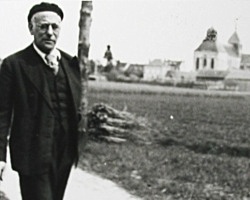
Max Jacob
(1876 – 1944)
Cimetière
Si mon marin vous le chassez
au cimetière vous le mettrez,
rose blanche,
rose blanche et rose rouge.
Ma tombe, elle est comme un jardin,
comme un jardin rouge et blanche,
Le dimanche vous irez,
rose blanche,
vous irez vous promener,
rose blanche et blanc muguet,
Tante
Yvonne à la
Toussaint
une couronne en fer peint
elle apporte de son jardin
en fer peint avec des perles de satin,
rose rouge et blanc muguet.
Si
Dieu veut me ressusciter
au
Paradis je monterai,
rose blanche,
avec un nimbe doré,
rose blanche et blanc muguet.
Si mon marin revenait,
rose rouge et rose blanche,
sur ma tombe il vient auprès,
rose blanche et blanc muguet.
Souviens-toi de notre enfance,
rose blanche,
quand nous jouions sur le quai,
rose blanche et blanc muguet.
Max Jacob poetry
fleursdumal.nl magazine
More in: Archive I-J, Jacob, Max
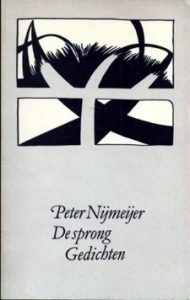 De dichter, vertaler en journalist Peter Nijmeijer (1947-2016), is op 9 september op 69-jarige leeftijd overleden.
De dichter, vertaler en journalist Peter Nijmeijer (1947-2016), is op 9 september op 69-jarige leeftijd overleden.
De Volkskrant berichtte deze week dat Nijmeijer in ‘volstrekte eenzaamheid’ is gestorven en dat het bericht van zijn dood, zelfs zijn naaste familieleden pas een maand later heeft bereikt. Hij was in de jaren zeventig poëzierecensent van deze krant.
Peter Nijmeijer was een zeer gewaardeerd vertaler van dichters als Seamus Heaney, Ted Hughes en Wallace Stevens. Titels van zijn eigen dichtbundels zijn o.a. De sprong, De afstand tot, De lippen van Max Ernst, Francesco’s Paradox en Barrage.
In Memoriam Peter Nijmeijer (1947-2016)
fleursdumal.nl magazine
More in: Archive M-N, Art & Literature News, In Memoriam

William Shakespeare
(1564-1616)
Good name in man and woman
Good name in man and woman, dear my lord,
Is the immediate jewel of their souls:
Who steals my purse steals trash; ’tis something, nothing;
‘Twas mine, ’tis his, and has been slave to thousands;
But he that filches from me my good name
Robs me of that which not enriches him
And makes me poor indeed.
William Shakespeare, “Othello”, Act 3 scene 3
Shakespeare 400 (1616 – 2016)
fleursdumal.nl magazine
More in: Archive S-T, Shakespeare, William

Adele Schopenhauer
(1797 – 1849)
An die Nacht
O stille Freundin Du! O wortlos ernste Nacht!
Nimm meinen lauten Schmerz in Deine Mutterarme!
Verhüll′ mein müdes Haupt in Deiner Schleier Pracht,
Daß dieses starre Herz in Thränenthau erwarme.
Zeig′ mir Ihn fern im Traum, erwecke heiß′res Sehnen –
Die harte Wirklichkeit nahm mir den Trost der Thränen.
Des Tages Forderung und seiner Fragen Qual,
Sie bleiben, fern gebannt, in weitem Kreise stehen –
Und frei von fremdem Zwang erhebt zum erstenmal
Die Seele sich empor, will weithin rückwärts sehen
Dorthin – wo sie geglaubt, dem Tod sich hinzugeben,
Und ach! so tief geirrt! sie gab sich hin – dem Leben!
Adele Schopenhauer Gedichte
fleursdumal.nl magazine
More in: Archive S-T, CLASSIC POETRY
Thank you for reading Fleurs du Mal - magazine for art & literature